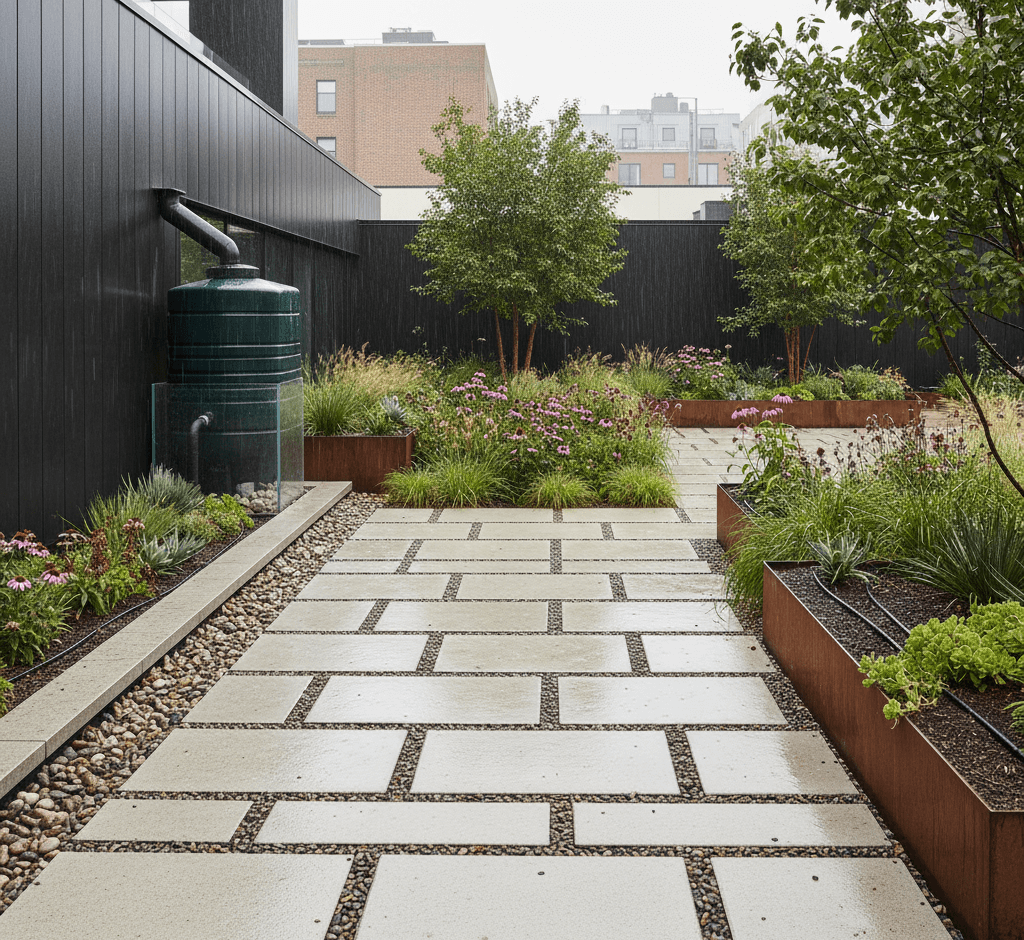Picture transforming your Doncaster backyard into a lush, low-maintenance oasis that not only boosts kerb appeal but also cools your home naturally during sweltering summers. In South Yorkshire, where urban expansion meets rural charm, sustainable landscaping trends are surging, with eco-friendly gardens reducing household energy costs by up to 15 per cent through strategic planting and shading. For property owners in Doncaster and Rotherham, embracing these innovations means crafting outdoor spaces that thrive amid local clay soils and variable rainfall, while enhancing biodiversity and property value. Dive into the latest trends reshaping gardens across the region.
What You’ll Learn
- Native planting strategies suited to South Yorkshire’s challenging soils.
- Water-wise features that combat drought and flooding.
- Eco-materials and permeable surfaces for durable, green designs.
- Wildlife-friendly elements to support local pollinators.
- How these trends elevate property resale in Doncaster and Rotherham markets.
Introduction
South Yorkshire’s unique blend of industrial heritage and green corridors makes landscaping trends in South Yorkshire a hot topic for property owners seeking sustainable outdoor spaces. From Doncaster’s suburban plots to Rotherham’s riverside homes, modern gardens prioritise resilience against climate shifts, water conservation, and minimal upkeep. These trends not only align with UK net-zero goals but also address regional issues like heavy clay soil and urban heat islands. Discover how incorporating native flora, smart irrigation, and recycled materials can turn your garden into a sustainable haven that saves time, money, and the planet.
Embracing Native Plants for Low-Maintenance Beauty
South Yorkshire’s clay-rich soils demand plants that adapt without constant intervention. Native species like hawthorn, dog rose, and Yorkshire fog grass establish deep roots, improving drainage and reducing erosion on sloped Rotherham gardens.
Top Native Choices and Planting Tips
Opt for pollinator magnets such as foxgloves and oxeye daisies to create vibrant borders.
- Plant in autumn for robust establishment before winter.
- Mix with wildflower meadows to cut mowing by 80 per cent.
- Source from local nurseries to ensure regional hardiness.
In Doncaster, these choices withstand gusty winds from the Pennines, fostering biodiversity while demanding less water and fertiliser.
Water-Smart Landscaping: Rain Gardens and Permeable Paving
With Rotherham prone to flash flooding and Doncaster facing summer droughts, water management is key. Rain gardens capture runoff, filtering pollutants naturally, while permeable paving allows infiltration to recharge groundwater.
Designing for Drainage and Drought
Install swales lined with moisture-loving plants like iris and rushes.
- Permeable gravel or porous blocks prevent puddles and comply with SUDS regulations.
- Harvest rainwater via barrels for irrigation, slashing mains usage by 50 per cent.
- Ideal for driveways in urban Rotherham, enhancing aesthetics without concrete overload.
These features mitigate local flood risks, as seen in recent Council initiatives promoting sustainable drainage.
Sustainable Materials: Recycled and Upcycled Features
Ditch imported stone for reclaimed Yorkshire millstone grit or recycled composite decking made from plastic waste. These materials lower carbon footprints and blend seamlessly with South Yorkshire’s industrial aesthetic.
Building with Eco-Innovation
- Use railway sleepers for raised beds, durable against wet winters.
- Incorporate upcycled metal sculptures for focal points.
- Choose FSC-certified timber to support responsible forestry.
For Doncaster homeowners, these options boost garden longevity, resisting the region’s damp climate without chemical treatments.
Wildlife Havens: Boosting Biodiversity in Urban Plots
South Yorkshire gardens can become vital corridors for declining species. Log piles, hedgehog highways, and bird feeders invite nature, countering habitat loss from development.
Creating Pollinator Paradises
Plant nectar-rich lavenders and buddleia in sunny Rotherham spots.
- Add ponds with native aquatic plants for amphibians.
- Avoid pesticides; opt for companion planting to deter pests naturally.
- Certifications like RHS Wildlife Garden enhance property appeal.
Local surveys show such gardens increase bird visits by 30 per cent, enriching daily life for families.
Smart Tech and Seasonal Adaptations for Year-Round Appeal
Integrate solar-powered lighting and app-controlled irrigation to maintain efficiency. In South Yorkshire’s variable weather, evergreen structures provide winter interest alongside seasonal blooms.
Tech-Enhanced Sustainability
- Sensor-based drippers deliver water only when needed.
- Vertical gardens maximise space in compact Doncaster terraces.
- Mulch with local compost to retain moisture and suppress weeds.
These adaptations ensure gardens flourish from frosty February to humid July, minimising maintenance for busy property owners.
Conclusion
Landscaping trends in South Yorkshire emphasise sustainability, transforming outdoor spaces into resilient, eco-friendly retreats. By adopting native plants, water-smart designs, and wildlife features, Doncaster and Rotherham residents create gardens that conserve resources, support local ecosystems, and increase home values by up to 10 per cent. Embrace these trends to future-proof your property against climate challenges while enjoying a beautiful, low-effort landscape.
Discover Your Perfect Landscaping Partner Today
At Leedle.co, we connect you with trusted service providers across various sectors, ensuring you find the right expert for your project. Whether it’s home improvement, legal advice, or creative services, start your journey to quality work today!
Frequently Asked Questions
Wondering how to kickstart your sustainable garden in South Yorkshire? These answers address common concerns for Doncaster and Rotherham property owners.
Hawthorn, dog rose, and purple loosestrife thrive in heavy clay, improving soil structure over time with minimal care.
Properly designed rain gardens absorb up to 90 per cent of runoff, significantly lowering flood chances in prone areas like riverside Rotherham.
Initial costs range from £50 to £100 per square metre, but longevity and reduced drainage fees offer savings within five years.
Yes, eco-friendly features appeal to buyers, potentially adding 5-10 per cent to resale value in competitive markets.
Minor works like planting usually do not, but ponds or structures over certain sizes may require approval; consult local experts via Leedle.co.










